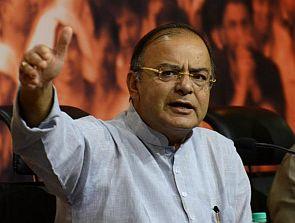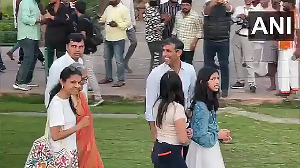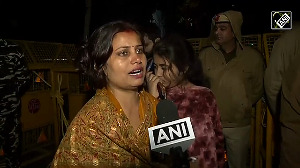 The finance minister is "reasonably confident" that when it comes to the crunch, "it would be extremely difficult even for the Congress party to take a contrarian view" on the GST Bill.
The finance minister is "reasonably confident" that when it comes to the crunch, "it would be extremely difficult even for the Congress party to take a contrarian view" on the GST Bill.
Rashme Sehgal reports for Rediff.com
Finance Minister Arun Jaitley expressed confidence that the Goods and Services Tax Bill would be passed in the Monsoon Session of Parliament given that the majority of regional parties, including United Progressive Alliance allies like the Dravida Munnetra Kazhagam and the Nationalist Congress Party, have all come out in support of this legislation.
Stating that it would be extremely difficult for the Congress to take a contrarian view, he said if there is no consensus, the only alternative was to have a parliamentary vote.
"I am reasonably confident because... every political party, including the Congress, favours the GST. In fact, the Congress should have had the wisdom to support it more aggressively because they could claim the original authorship of the idea," Jaitley said during the course of an interaction with journalists in New Delhi on Monday, May 16.
"Every regional party, whether it is the Samajwadi Party or BSP (Bahujan Samaj Party) in Uttar Pradesh, JD-U (Janata Dal-United) or RJD (Rashtriya Janata Dal) in Bihar, the Left in West Bengal and Kerala, the Trinamool Congress in West Bengal, the Biju Janata Dal... each one of the UPA partners from the DMK to NCP is making strong noises in support."
Jaitley is "reasonably confident" that when it comes to the crunch, "it would be extremely difficult even for the Congress party to take a contrarian view".
The GST bill, which has been approved by the Lok Sabha, is pending in the Rajya Sabha because of stiff resistance by the Congress, the largest party in the House, over a few proposals.
"I hope the Congress party would revisit its position. I certainly would be keeping the discussions with them on. I always said my preference is a consensus must emerge because all state governments across political complexion has to implement it and therefore, consensus is the better way," Jaitley said.
""And I do hope it moves in that direction," Jaitley said. "If consensus does not emerge, then the only other alternative is the parliamentary process. We will ask the Rajya Sabha and take a view on it."
The minister said the number count of all those parties that are supporting the GST shows that barring the All India Anna Dravida Munnetra Kazhagam, which has some mixed voices, every other regional party has strong interest in passing the legislation because it helps these states.
Jaitley said he has spoken to the chief ministers of all states, including those ruled by the UPA and the Congress, and they are a "strong supporter" of the GST because the chief ministers have their own interests to protect of their state.
The Congress is opposing the bill in the current form, demanding that a cap on the GST rate be included in the Constitution Amendment Bill. The other two changes sought are removal of one per cent additional tax on inter-state transfer of goods and a Supreme Court judge-headed dispute resolution panel.
Except for the additional inter-state tax, Jaitley said the GST Bill is verbatim of what the UPA had earlier proposed though he emphasised that he was willing to consider the additional one per cent inter-state tax.
"The rest of the GST Bill was verbatim what the UPA had introduced. And therefore, one has to analyse these after-thoughts. Now, the Parliamentary Standing Committee has approved it, the Rajya Sabha Select Committee has approved it, minus that 1 per cent," he said.
The GST Bill, India's biggest indirect tax reform since Independence, would help simplify state and central levies thereby helping people do business.
On whether he had an adversarial relationship with Reserve Bank Governor Raghuram Rajan, the minister pointed out that both the RBI and the finance minister shared "an institutional relationship."
"The highest level in these two institutions have discussions and each others' views are considered between us. What appears in the media should not be given credence," but on the entire contentious issue of whether Dr Rajan would be given an extension, Jaitley said, "such an issue is not discussed before the media."
The minister emphasised that the holding one holding one medical examination throughout the country was an executive decision for which the "fairness and integrity of the examination process should be maintained at all cost."
However he stressed that there "must be a fair opportunity for all to compete in these examinations, some state government boards are unequal, the languages are dissimilar," which raised the question of whether they be asked to give the same exam. The matter was under discussion and political parties were meeting consequently to discuss this issue.
Flagging concerns over judicial 'overreach' yet again, the finance minister made it clear that the judiciary must draw its own "Lakshman Rekha" and not take decisions, which fall in the domain of the executive.
He pointed out that he had raised this issue even when he was in the Opposition. "Judicial review is the legitimate domain of the judiciary, but then the Lakshman Rekha has to be drawn by all the institutions themselves. The Lakshman Rekha is very vital," he said, asserting that "the executive decisions are to be taken by the executive and not the judiciary."
"Executive decisions must be taken by the executive alone. If the executive takes decisions, the people have three recourses. If they do not like the decisions, they can ask the executive to change it, ask the courts to strike it down, or else the people can vote the government out of power," Jaitley said.
"When courts take executive decisions, none of these choices are available to the people," he poimted out. "While the courts have the right to review executive decisions, the courts cannot substitute the role of the executive."
"Courts cannot substitute the executive and say I will exercise the executive power. If you do so, the three options will not be available, which are there when the executive takes executive decisions," he said.
Jaitley's response to the issue of drought was completely inadequate given its magnitude. He pointed out that not only had his government released funds through the national and state disaster relief funds but that in the drought affected states, the National Rural Employment Guarantee Act had been extended from 100 to 150 days.
"Every rupee spent (on drought) has been sanctioned by Parliament and I would not like Parliament's authority to be diluted," he said adding that during his ministership more money had been allocated for drought relief than had been done in the past.
On the issue of whether the relationship between the Treasury benches and the Opposition had become more acrimonious, Jaitley replied that this was not a new phenomenon and has been there since 1971.
"Even if there are strong political differences, there is always a need for civility and discourse," he stressed.
Two points need to be born in mind the minister emphasised, "We must concentrate on issues and not persons and secondly, while giving arguments, we must do it in a language which raises the public discourse."
Wearing his hat as information and broadcasting minister, he pointed out that the issue of paid news had acquired unprecedented dimensions. "Gone are the days when censorship was possible. The media is too large and our democracy is large enough to live with this. Paid news cannot hope to get free press protection."
India, he further warned, would have to address this issue because excessive advertising was acquiring the perception of political bribery. "Excessive advertising can evolve into political bribery," he maintained.
On the issue of the extradition of former Rajya Sabha MP Vijay Mallya, he said that on the issue of deportation, the UK government has never been helpful. However, with the chargesheet having been filed, Indian agencies would make every effort under due process of law to extradite him.











 © 2025
© 2025